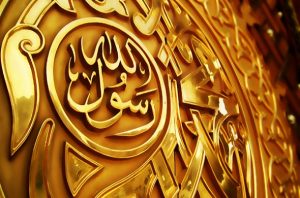By: Salman Al-Oadah
One feels amazed by the degree of detailing in the description of the Prophet’s physical features. The scholars talked about his external traits in the minutest way.
His Hair
Thus, they described the hair on his head. It was neither tightly curly nor completely straight, but between the two. At times it would grow until it reached his shoulders, and at others he would cut it to the level of half the ears. And he took good care of it:
Aisha said that “when he was combing his hair, it was like paths of sand being furrowed by that comb”. (Al-Bayhaqi))
Um Hani’ reports that ‘the Messenger of God once came to Mecca, and he had four braids’. (Ahmad, Abu Dawud, At-Tirmidhi)
In another report, she says: “I saw four braids in the hair of the Messenger of God”. (Ahmad, Abu Dawud, At-Tabarani)
His Face
His face was also meticulously portrayed. He had a round face (Muslim, Ibn Hibban), not a complete roundness, but it was like the moon when it is complete. And it was white with a slight ruddiness, as if the sun or the moon were running in it. (Ahmad, Muslim, Al-Bayhaqi) He also had a broad forehead.
Aisha said: ‘The Messenger had a spread out forehead. When it appeared from among the hair, or he would look at us at daybreak or at the onset of the night, or when he turned up to face people, they would see as if the light of a lantern were twinkling on his forehead’. (Al-Bayhaqi, Ibn `Assakir)
His eyes were large and white, as if having kohl. (Ahmad, At-Tirmidhi, At-Tabarani, Al-Bayhaqi) His nose was straight with a little protruding in the middle. (At-Tabarani, Al-Bayhaqi) His cheeks were straight and white. (At-Tabarani, Al-Bayhaqi) His mouth was rather large (Ahmad, Muslim, At-Tirmidhi) and had space between his foreteeth. (At-Tabarani, Al-Bayhaqi) He took great care to clean his teeth by brushing them. (Ahmad, Al-Bukhari, Muslim)
He also had a thick beard. (Ahmad, Muslim, Ibn Hibban) Yet it was neither too long nor too short. He made a point of combing it, cleaning it, anointing it and perfuming it. (Ahmad, Al-Bukhari, Muslim, An-Nasa’i, Ibn Hibban)
His Body
His body was moderate in everything. He was neither too tall, nor too short, but average height. (Ahmad, Al-Bukhari, Muslim)
His Clothing
As for his clothing, he was not particularly strict on garments. He would not ask for what was not to be found, nor refute what was at hand. He put on a gown imported from Levant. (Ahmad, Al-Bukhari, At-Tirmidhi, Ibn Majah)
He put on a turban. (Ahmad, Muslim, Abu Dawud, Ibn Majah, At-Tirmidhi)
And he put on a cloak and a wrapper. (Ahmad, Al-Bukhari, Muslim) He used to like good, clean clothing. But he did not exaggerate in it and dressed without the least sense of pride. He never wore long clothes. He warned people against it, especially if it was accompanied by vanity. He said: ‘God turns away from one who drags his clothes out of vanity’. (Ahmad, Al-Bukhari, Muslim, Abu Dawud, At-Tirmidhi)
His Humility
The Prophet was the best exemplar of simplicity, and hated vanity and arrogance. His constant aim was to remain close to the people in his nutrition, clothing, transport, and when sitting. One day he slept on a bed which left its traces on the side of his body (Ahmad, Al-Bukhari, Muslim) because there was nothing thick between him and the bed. He would often sit on the ground, eat on the floor, and sit on a straw mat. (Ahmad, Al-Bukhari, Muslim)
One day, Mulaikah, Anas iin Malik’s grandmother, invited the Prophet over to share a meal which she had prepared in his honor.
He answered and ate of the food, then said: ‘Stand up so you can pray behind me’. Anas said: ‘So I brought a straw mat which had grown black with use. I sprayed it with water, and then the Prophet stood on it. The orphan and I stood behind him, and the elderly woman behind us. He prayed two rak’has and then he left.’ (Ahmad, Al-Bukhari, Muslim, Abu Dawud, An-Nasa’i)
The mountains would have been made gold and silver for him if so he had wished. Yet what he loved was simplicity (Ahmad, At-Tirmidhi, At-Tabari) and spontaneity. He stayed away from affected behaviour. He preferred to be close to the people and be one of them, never assigning on them tasks beyond their capacity.
_________________________
The article is excerpted from the author’s book “In the Company of the Prophet (God’s Chosen Messenger)”.
 Arabic
Arabic English
English Spanish
Spanish Russian
Russian Romanian
Romanian Hindi
Hindi Tagalog
Tagalog Bengali
Bengali Sinhalese
Sinhalese Nepali
Nepali


